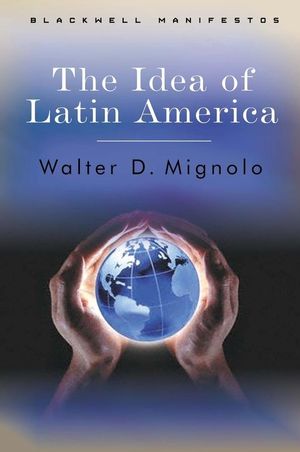The Idea of Latin AmericaISBN: 978-1-4051-0086-1
Paperback
220 pages
January 1991, Wiley-Blackwell
 This is a Print-on-Demand title. It will be printed specifically to fill your order. Please allow an additional 10-15 days delivery time. The book is not returnable.
Other Available Formats: Hardcover
|
||||||
Winner of the 2006 Frantz Fanon Prize for Outstanding Work in or on the Caribbean Thought in the English Language
“What's in a name? This vigorous, politically engaged essay reveals the 'colonial matrix of power' behind the invention of the term Latin America. A timely and significant contribution to de-colonial theory and to debates about new social movements in the Americas.” John King, Warwick University
“In this gilded age of hyper-theory, and the next big paradigm that supersedes the latest, and the anxiety of not having a paradigm; in this age of theory hyper-inflation, and the furor over the latest missive from the “great masters,” it is mentally refreshing to read a major work that is not burdened by obsequiousness toward the intellectual fashions of the EuroAmerican dominated market place of ideas, and that without great fanfare manages to turn on their head all our assumptions about our place on the map of history and reason. Walter Mignolo’s The Idea of Latin America has elegantly achieved what great manifestos generally accomplish. It has announced the obsolescence of entrenched ways of thinking; it has given us new conceptual and historical narratives; and it has opened up an effaced, ignored, and derogated archive. What is announced in this book is not a new paradigm, but the existence of a type of thinking that has been producing new epistemic sites and weaving counter-narratives that both challenge the claim to universality of EuroAmerican theorizing and that nonetheless explain its origins, political economy, resilience and insidiousness. We simply will not be able to see “America” and “Latin America” in the same way after this book. Brilliantly Mignolo offers this new optics and geopolitics of knowledge by rejecting the epistemic-historical-onto-theological blackmail imposed by EuroAmerican hyper-theory: either Orientalism or Occidentalism. Beyond this imperial Manicheanism of the new, latest, improved Euro-American paradigm, beyond either you are for us (Eurocentrism), or you are against us (Thirdworldism), there is a way of thinking that looks at the geography of reason transversally, across and sideways, and not in terms of time-tables and invidious hierarchies, which allows to think many worlds co-existing in empathic solidarity. On the shelf of those works one thinks with in order to think beyond, where one finds the books of Fanon, Said, C.R. L. James, Shiva, and Retamar, one will now have to put those of Walter Mignolo.” Eduardo Mendieta, Stony Brook University



